Walbank F.W., Astin A.E., Frederiksen M.W., Ogilvie R.M. The Cambridge Ancient History, Volume 7, Part 1: The Hellenistic World
Подождите немного. Документ загружается.

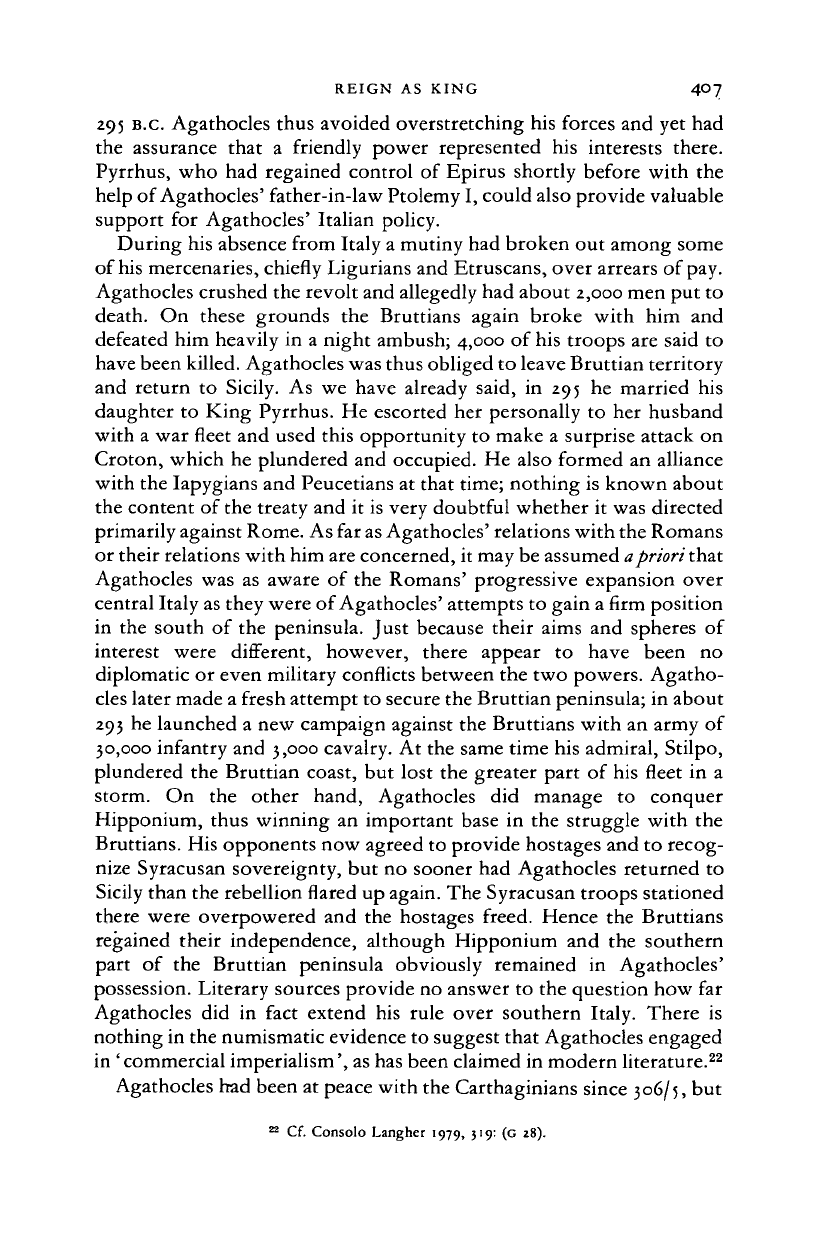
REIGN AS KING 407
295 B.C. Agathocles thus avoided overstretching his forces and yet had
the assurance that
a
friendly power represented
his
interests there.
Pyrrhus, who had regained control
of
Epirus shortly before with
the
help of Agathocles' father-in-law Ptolemy I, could also provide valuable
support
for
Agathocles' Italian policy.
During his absence from Italy a mutiny had broken out among some
of
his
mercenaries, chiefly Ligurians and Etruscans, over arrears of pay.
Agathocles crushed the revolt and allegedly had about 2,000 men put to
death.
On
these grounds
the
Bruttians again broke with
him and
defeated him heavily
in a
night ambush; 4,000
of
his troops are said
to
have been killed. Agathocles was thus obliged to leave Bruttian territory
and return
to
Sicily.
As we
have already said,
in
295
he
married
his
daughter
to
King Pyrrhus. He escorted her personally
to her
husband
with
a
war fleet and used this opportunity to make
a
surprise attack
on
Croton, which he plundered and occupied. He also formed an alliance
with the Iapygians and Peucetians at that time; nothing is known about
the content of the treaty and
it
is very doubtful whether
it
was directed
primarily against Rome. As far
as
Agathocles' relations with the Romans
or their relations with him are concerned, it may be assumed a
priori
that
Agathocles was
as
aware
of
the Romans' progressive expansion over
central Italy as they were of Agathocles' attempts to gain a firm position
in
the
south
of
the peninsula. Just because their aims
and
spheres
of
interest were different, however, there appear
to
have been
no
diplomatic or even military conflicts between the two powers. Agatho-
cles later made a fresh attempt to secure the Bruttian peninsula; in about
293 he launched a new campaign against the Bruttians with an army of
30,000 infantry and 3,000 cavalry. At the same time his admiral, Stilpo,
plundered the Bruttian coast,
but
lost the greater part
of
his fleet
in a
storm.
On the
other hand, Agathocles
did
manage
to
conquer
Hipponium, thus winning
an
important base
in the
struggle with
the
Bruttians. His opponents now agreed to provide hostages and to recog-
nize Syracusan sovereignty, but no sooner had Agathocles returned
to
Sicily than the rebellion flared up again. The Syracusan troops stationed
there were overpowered
and the
hostages freed. Hence
the
Bruttians
regained their independence, although Hipponium
and the
southern
part
of the
Bruttian peninsula obviously remained
in
Agathocles'
possession. Literary sources provide no answer to the question how
far
Agathocles
did in
fact extend
his
rule over southern Italy. There
is
nothing in the numismatic evidence to suggest that Agathocles engaged
in ' commercial imperialism', as has been claimed in modern literature.
22
Agathocles had been at peace with the Carthaginians since 306/5, but
22
Cf.
Consolo Langher 1979, 319: (G
28).
Cambridge Histories Online © Cambridge University Press, 2008
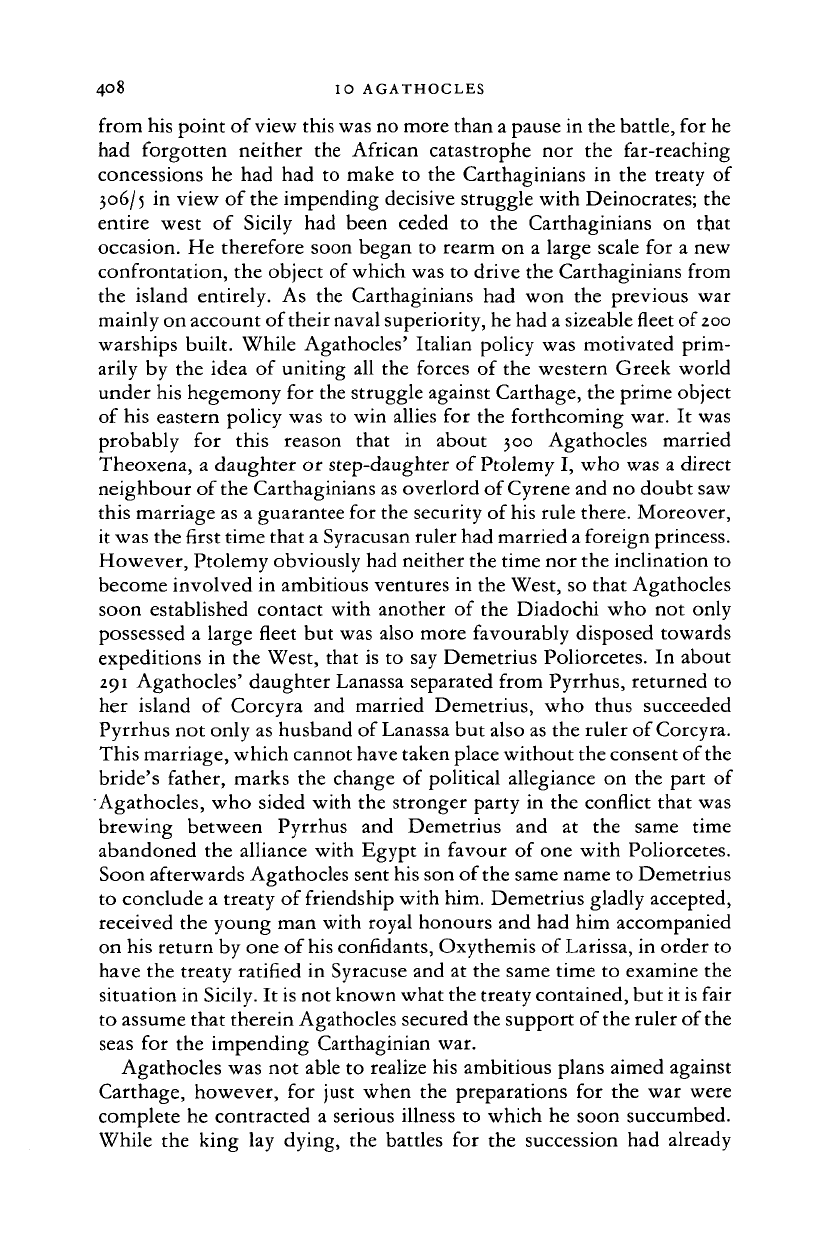
408 IO
AGATHOCLES
from his point of view this was no more than a pause in the battle, for he
had forgotten neither the African catastrophe nor the far-reaching
concessions he had had to make to the Carthaginians in the treaty of
306/5 in view of the impending decisive struggle with Deinocrates; the
entire west of Sicily had been ceded to the Carthaginians on that
occasion. He therefore soon began to rearm on a large scale for a new
confrontation, the object of which was to drive the Carthaginians from
the island entirely. As the Carthaginians had won the previous war
mainly on account of their naval superiority, he had a sizeable
fleet
of
200
warships built. While Agathocles' Italian policy was motivated prim-
arily by the idea of uniting all the forces of the western Greek world
under his hegemony for the struggle against Carthage, the prime object
of his eastern policy was to win allies for the forthcoming war. It was
probably for this reason that in about 300 Agathocles married
Theoxena, a daughter or step-daughter of Ptolemy I, who was a direct
neighbour of the Carthaginians as overlord of Cyrene and no doubt saw
this marriage as a guarantee for the security of
his
rule there. Moreover,
it was the first time that a Syracusan ruler had married a foreign princess.
However, Ptolemy obviously had neither the time nor the inclination to
become involved in ambitious ventures in the West, so that Agathocles
soon established contact with another of the Diadochi who not only
possessed a large fleet but was also more favourably disposed towards
expeditions in the West, that is to say Demetrius Poliorcetes. In about
291 Agathocles' daughter Lanassa separated from Pyrrhus, returned to
her island of Corcyra and married Demetrius, who thus succeeded
Pyrrhus not only as husband of Lanassa but also as the ruler of Corcyra.
This marriage, which cannot have taken place without the consent of the
bride's father, marks the change of political allegiance on the part of
Agathocles, who sided with the stronger party in the conflict that was
brewing between Pyrrhus and Demetrius and at the same time
abandoned the alliance with Egypt in favour of one with Poliorcetes.
Soon afterwards Agathocles sent his son of
the
same name to Demetrius
to conclude a treaty of friendship with him. Demetrius gladly accepted,
received the young man with royal honours and had him accompanied
on his return by one of
his
confidants, Oxythemis of Larissa, in order to
have the treaty ratified in Syracuse and at the same time to examine the
situation in Sicily. It is not known what the treaty contained, but it
is
fair
to assume that therein Agathocles secured the support of
the
ruler of the
seas for the impending Carthaginian war.
Agathocles was not able to realize his ambitious plans aimed against
Carthage, however, for just when the preparations for the war were
complete he contracted a serious illness to which he soon succumbed.
While the king lay dying, the battles for the succession had already
Cambridge Histories Online © Cambridge University Press, 2008
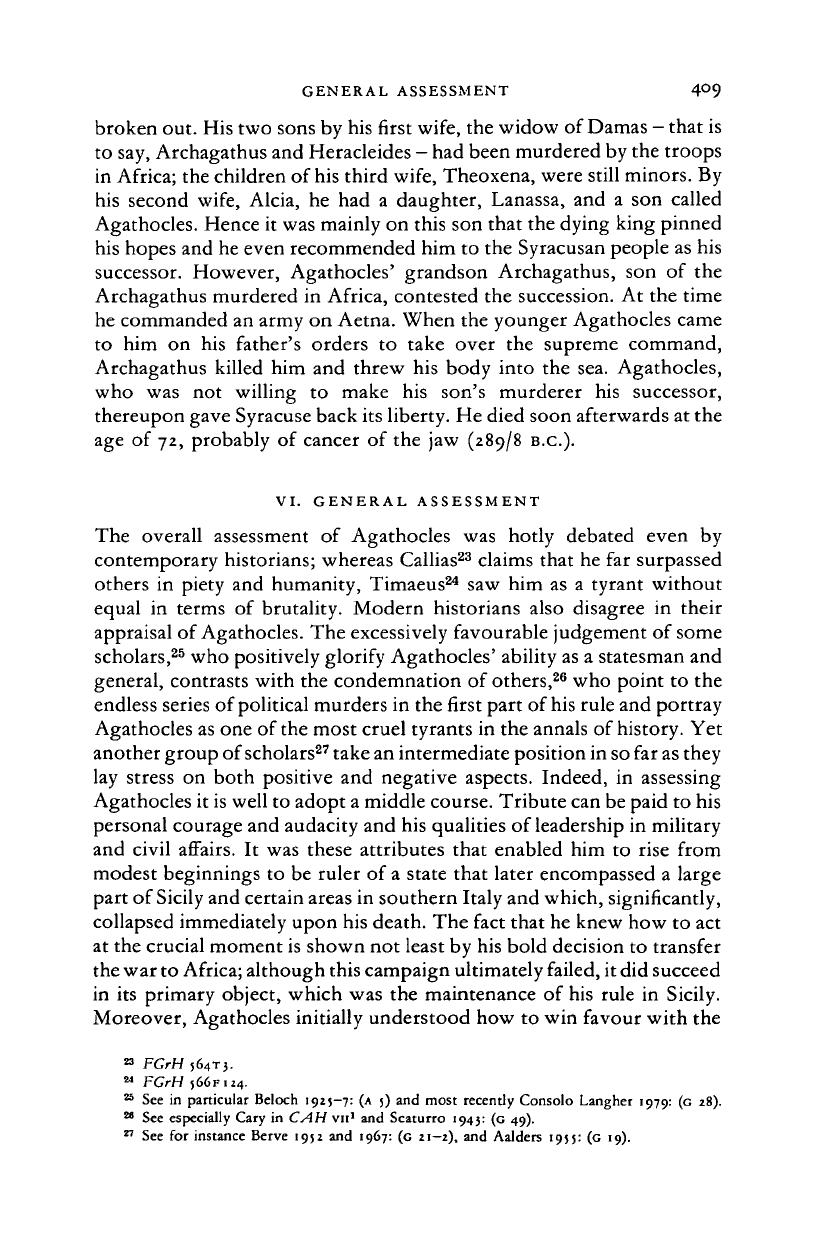
GENERAL ASSESSMENT
4°9
broken out. His two sons by his first wife, the widow of Damas
-
that
is
to say, Archagathus and Heracleides
-
had been murdered by the troops
in Africa; the children
of
his
third wife, Theoxena, were still minors.
By
his second wife, Alcia,
he had
a
daughter, Lanassa,
and
a
son
called
Agathocles. Hence
it
was mainly
on
this son that the dying king pinned
his hopes and he even recommended him
to
the Syracusan people as
his
successor. However, Agathocles' grandson Archagathus,
son
of
the
Archagathus murdered
in
Africa, contested
the
succession.
At the
time
he commanded an army on Aetna. When the younger Agathocles came
to
him
on
his
father's orders
to
take over
the
supreme command,
Archagathus killed
him and
threw
his
body into
the sea.
Agathocles,
who
was
not
willing
to
make
his
son's murderer
his
successor,
thereupon gave Syracuse back its liberty. He died soon afterwards at the
age
of
72, probably
of
cancer
of
the
jaw
(289/8 B.C.).
VI.
GENERAL ASSESSMENT
The overall assessment
of
Agathocles
was
hotly debated even
by
contemporary historians; whereas Callias
23
claims that
he far
surpassed
others
in
piety
and
humanity, Timaeus
24
saw him as a
tyrant without
equal
in
terms
of
brutality. Modern historians also disagree
in
their
appraisal
of
Agathocles.
The excessively favourable judgement
of
some
scholars,
25
who positively glorify Agathocles' ability as
a
statesman and
general, contrasts with
the
condemnation
of
others,
26
who point
to the
endless series
of
political murders
in
the first part
of
his
rule and portray
Agathocles as one
of
the
most cruel tyrants
in
the annals
of
history.
Yet
another group of scholars
27
take an intermediate position in so far as they
lay stress
on
both positive
and
negative aspects. Indeed,
in
assessing
Agathocles
it
is well to adopt a middle course. Tribute can be paid
to
his
personal courage and audacity and his qualities
of
leadership
in
military
and civil affairs.
It
was
these attributes that enabled
him to
rise from
modest beginnings
to be
ruler
of
a state that later encompassed
a
large
part
of
Sicily
and certain areas
in
southern Italy and which, significantly,
collapsed immediately upon his death. The fact that he knew how
to
act
at the crucial moment is shown
not
least by his bold decision
to
transfer
the war to Africa; although this campaign ultimately failed, it did succeed
in
its
primary object, which was
the
maintenance
of
his rule
in
Sicily.
Moreover, Agathocles initially understood how
to
win favour with
the
23
FGrH
564T3.
24
FGrH
S
66FI2
4
.
25
See
in
particular Beloch 1925-7: (A
;)
and
most recently Consolo Langher 1979: (G
28).
29
See
especially Cary
in
CAH
vn
1
and
Scaturro 1943:
(c
49).
27
See for
instance Berve
1952 and 1967: (G
21—2),
and
Adders 1955:
(G 19).
Cambridge Histories Online © Cambridge University Press, 2008
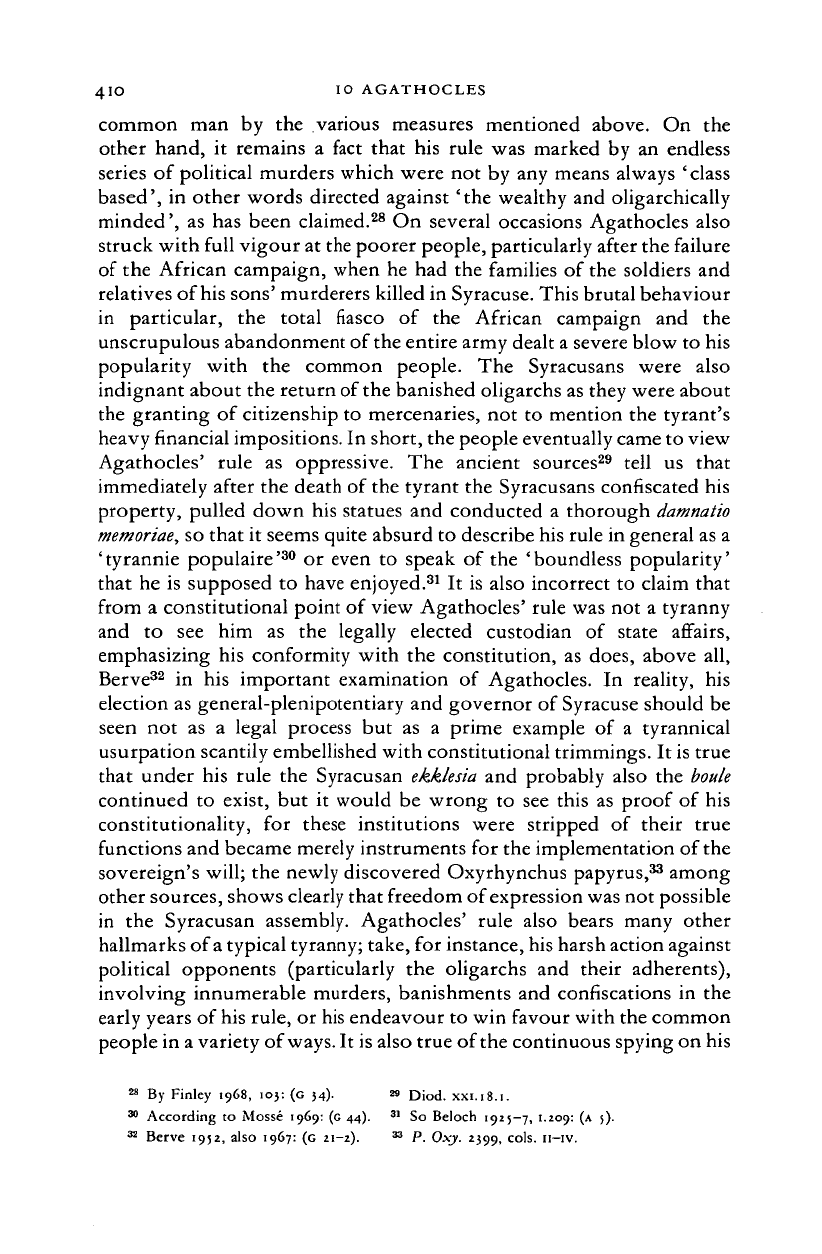
4IO 10
AGATHOCLES
common man by the various measures mentioned above. On the
other hand, it remains a fact that his rule was marked by an endless
series of political murders which were not by any means always 'class
based', in other words directed against 'the wealthy and oligarchically
minded', as has been claimed.
28
On several occasions Agathocles also
struck with full vigour at the poorer people, particularly after the failure
of the African campaign, when he had the families of the soldiers and
relatives of his sons' murderers killed in Syracuse. This brutal behaviour
in particular, the total fiasco of the African campaign and the
unscrupulous abandonment of the entire army dealt a severe blow to his
popularity with the common people. The Syracusans were also
indignant about the return of the banished oligarchs as they were about
the granting of citizenship to mercenaries, not to mention the tyrant's
heavy financial impositions. In short, the people eventually came to view
Agathocles' rule as oppressive. The ancient sources
29
tell us that
immediately after the death of the tyrant the Syracusans confiscated his
property, pulled down his statues and conducted a thorough
damnatio
memoriae,
so that it seems quite absurd to describe his rule in general as a
'tyrannie populaire'
30
or even to speak of the 'boundless popularity'
that he is supposed to have enjoyed.
31
It is also incorrect to claim that
from a constitutional point of view Agathocles' rule was not a tyranny
and to see him as the legally elected custodian of state affairs,
emphasizing his conformity with the constitution, as does, above all,
Berve
32
in his important examination of Agathocles. In reality, his
election as general-plenipotentiary and governor of Syracuse should be
seen not as a legal process but as a prime example of a tyrannical
usurpation scantily embellished with constitutional trimmings. It is true
that under his rule the Syracusan
ekklesia
and probably also the
boule
continued to exist, but it would be wrong to see this as proof of his
constitutionality, for these institutions were stripped of their true
functions and became merely instruments for the implementation of the
sovereign's will; the newly discovered Oxyrhynchus papyrus,
33
among
other sources, shows clearly that freedom of expression was not possible
in the Syracusan assembly. Agathocles' rule also bears many other
hallmarks of a typical tyranny; take, for instance, his harsh action against
political opponents (particularly the oligarchs and their adherents),
involving innumerable murders, banishments and confiscations in the
early years of his rule, or his endeavour to win favour with the common
people in a variety of
ways.
It is also true of the continuous spying on his
28
By Finley 1968, 103: (G 34). » Diod.
xxi.18.1.
30
According to Mosse 1969:
(G
44).
31
So Beloch 1925—7,
1.209:
(A 5).
32
Berve 1952, also 1967: (G 21-2).
ra
P. Oxy. 2399, cols,
II-IV.
Cambridge Histories Online © Cambridge University Press, 2008
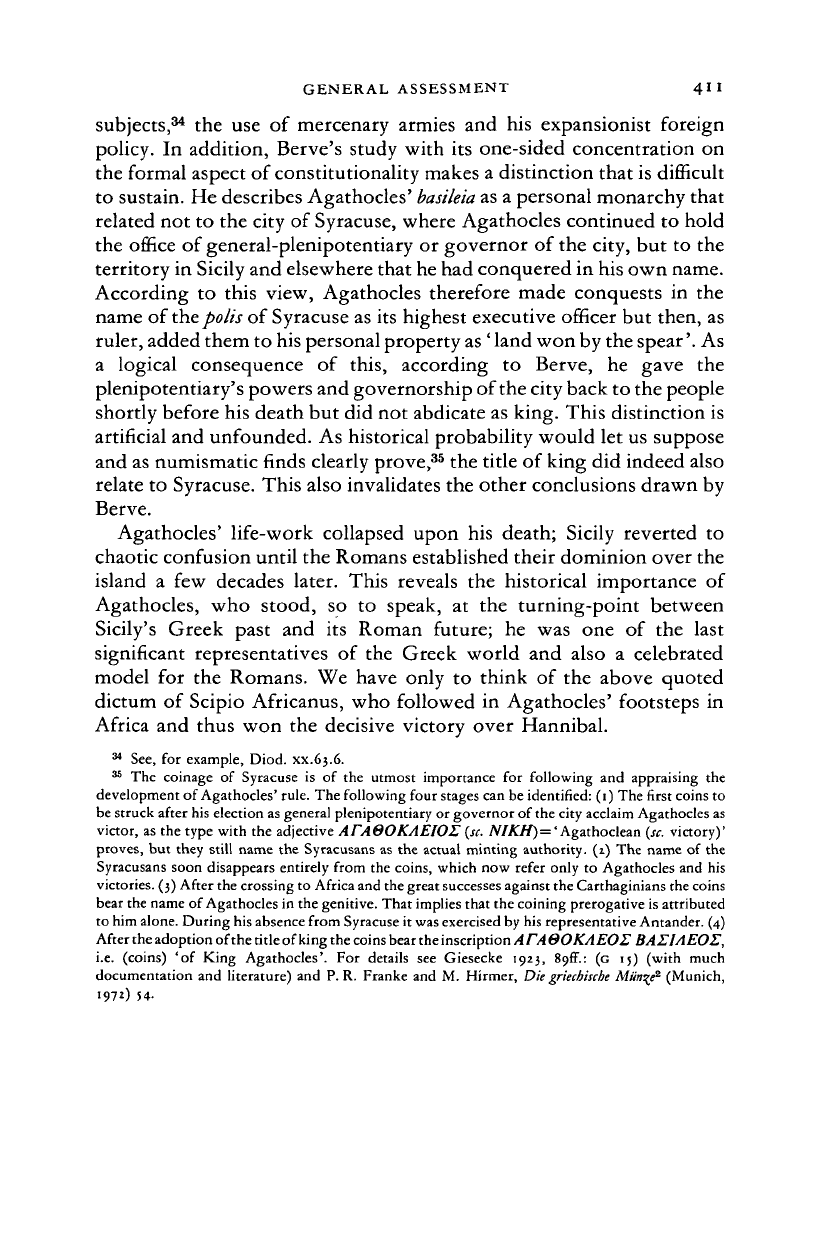
GENERAL ASSESSMENT 411
subjects,
34
the use
of
mercenary armies
and his
expansionist foreign
policy.
In
addition, Berve's study with
its
one-sided concentration
on
the formal aspect
of
constitutionality makes a distinction that is difficult
to sustain. He describes Agathocles'
basileia
as a personal monarchy that
related not
to
the city
of
Syracuse, where Agathocles continued
to
hold
the office
of
general-plenipotentiary
or
governor
of
the city,
but to the
territory in Sicily and elsewhere that he had conquered in his own name.
According
to
this view, Agathocles therefore made conquests
in
the
name
of
the po/is
of
Syracuse as its highest executive officer but then,
as
ruler, added them to his personal property
as
' land won by the spear'. As
a logical consequence
of
this, according
to
Berve,
he
gave
the
plenipotentiary's powers and governorship of the city back to the people
shortly before his death but did not abdicate as king. This distinction is
artificial and unfounded. As historical probability would
let
us suppose
and as numismatic finds clearly prove,
35
the title
of
king did indeed also
relate
to
Syracuse. This also invalidates the other conclusions drawn by
Berve.
Agathocles' life-work collapsed upon
his
death; Sicily reverted
to
chaotic confusion until the Romans established their dominion over the
island
a
few
decades later. This reveals
the
historical importance
of
Agathocles,
who
stood,
so to
speak,
at the
turning-point between
Sicily's Greek past
and its
Roman future;
he
was one
of
the
last
significant representatives
of
the
Greek world
and
also
a
celebrated
model
for the
Romans.
We
have only
to
think
of
the
above quoted
dictum
of
Scipio Africanus, who followed
in
Agathocles' footsteps
in
Africa
and
thus
won the
decisive victory over Hannibal.
34
See,
for
example, Diod. xx.63.6.
35
The
coinage
of
Syracuse
is of the
utmost importance
for
following
and
appraising
the
development
of
Agathocles' rule. The following four stages can be identified: (1) The first coins
to
be struck after his election as general plenipotentiary
or
governor
of
the city acclaim Agathocles
as
victor,
as
the type with
the
adjective AFA8OKAEIOZ
(sc.
NIKH)
='
Agathoclean
(sc.
victory)'
proves,
but
they still name
the
Syracusans
as the
actual minting authority.
(2)
The name
of
the
Syracusans soon disappears entirely from the coins, which
now
refer only
to
Agathocles and
his
victories. (3) After the crossing
to
Africa and the great successes against the Carthaginians the coins
bear the name of Agathocles
in
the genitive. That implies that the coining prerogative is attributed
to him alone. During his absence from Syracuse
it
was exercised by his representative Antander. (4)
After the adoption of the title of king the coins bear the inscription AFA&OKAEOZ BAX1AEOL,
i.e. (coins)
'of
King Agathocles'.
For
details
see
Giesecke
1923,
89ff.:
(G 15)
(with much
documentation
and
literature)
and
P. R. Franke
and M.
Hirmer,
Die
griechische
Miin^e*
(Munich,
1972)
J4.
Cambridge Histories Online © Cambridge University Press, 2008
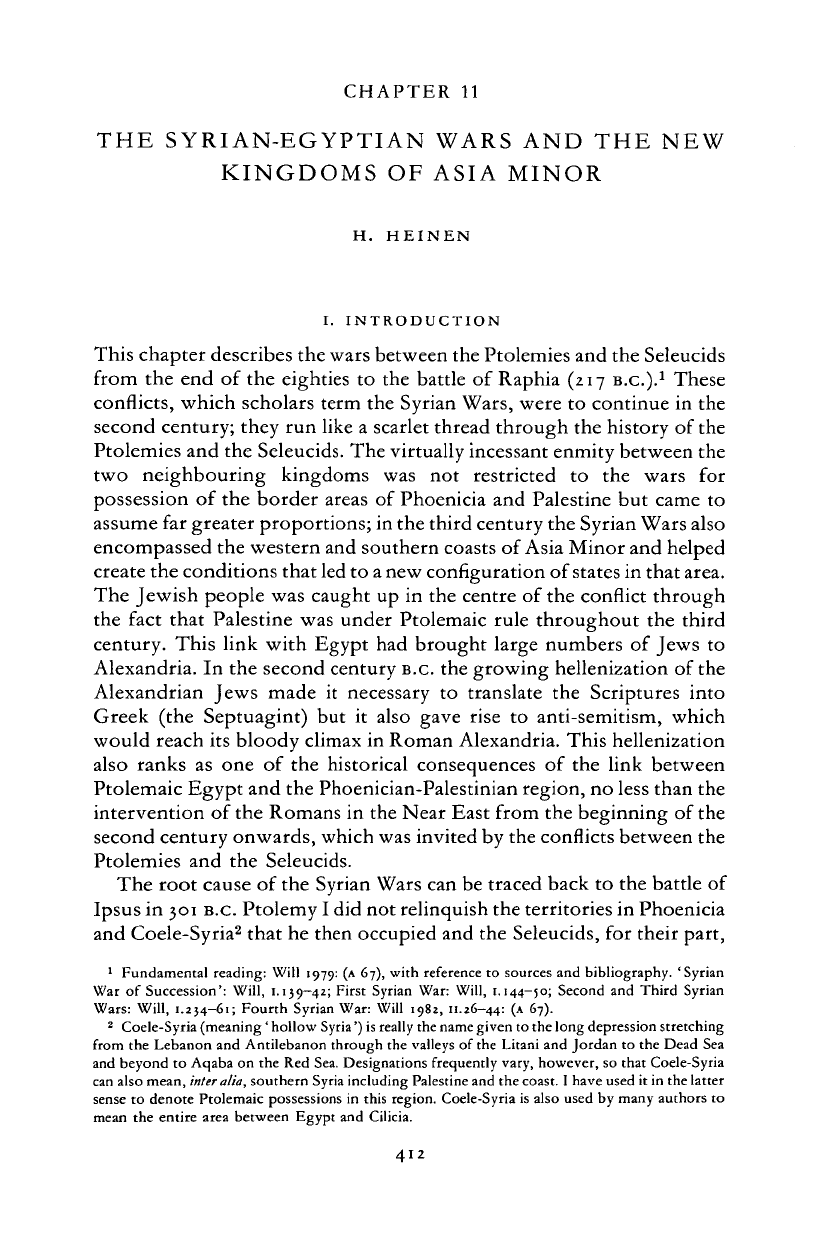
CHAPTER
11
THE SYRIAN-EGYPTIAN WARS AND THE NEW
KINGDOMS OF ASIA MINOR
H.
HEINEN
I. INTRODUCTION
This chapter describes the wars between the Ptolemies and the Seleucids
from the end of the eighties to the battle of Raphia (217 B.C.).
1
These
conflicts, which scholars term the Syrian Wars, were to continue in the
second century; they run like a scarlet thread through the history of the
Ptolemies and the Seleucids. The virtually incessant enmity between the
two neighbouring kingdoms
was not
restricted
to the
wars
for
possession of the border areas of Phoenicia and Palestine but came
to
assume far greater proportions; in the third century the Syrian Wars also
encompassed the western and southern coasts of Asia Minor and helped
create the conditions that led to
a
new configuration of states in that area.
The Jewish people was caught up in the centre of the conflict through
the fact that Palestine was under Ptolemaic rule throughout the third
century. This link with Egypt had brought large numbers of Jews
to
Alexandria. In the second century
B.C.
the growing hellenization of the
Alexandrian Jews made
it
necessary
to
translate the Scriptures into
Greek (the Septuagint) but
it
also gave rise
to
anti-semitism, which
would reach its bloody climax in Roman Alexandria. This hellenization
also ranks
as
one
of
the historical consequences
of
the link between
Ptolemaic Egypt and the Phoenician-Palestinian region, no less than the
intervention of the Romans in the Near East from the beginning of the
second century onwards, which was invited by the conflicts between the
Ptolemies and the Seleucids.
The root cause of the Syrian Wars can be traced back to the battle of
Ipsus in 301
B.C.
Ptolemy I did not relinquish the territories in Phoenicia
and Coele-Syria
2
that he then occupied and the Seleucids, for their part,
1
Fundamental reading: Will 1979:
(A
67), with reference to sources and bibliography. 'Syrian
War
of
Succession': Will,
1.139—42;
First Syrian War: Will,
1.144-jo;
Second and Third Syrian
Wars:
Will, 1.234-61; Fourth Syrian War: Will 1982, 11.26-44:
(A
67).
2
Coele-Syria (meaning ' hollow Syria') is really the name given to the long depression stretching
from the Lebanon and Antilebanon through the valleys of the Litani and Jordan to the Dead Sea
and beyond to Aqaba on the Red Sea. Designations frequently vary, however, so that Coele-Syria
can also mean,
inter
alia,
southern Syria including Palestine and the coast. I have used it in the latter
sense to denote Ptolemaic possessions in this region. Coele-Syria is also used by many authors to
mean the entire area between Egypt and Cilicia.
412
Cambridge Histories Online © Cambridge University Press, 2008
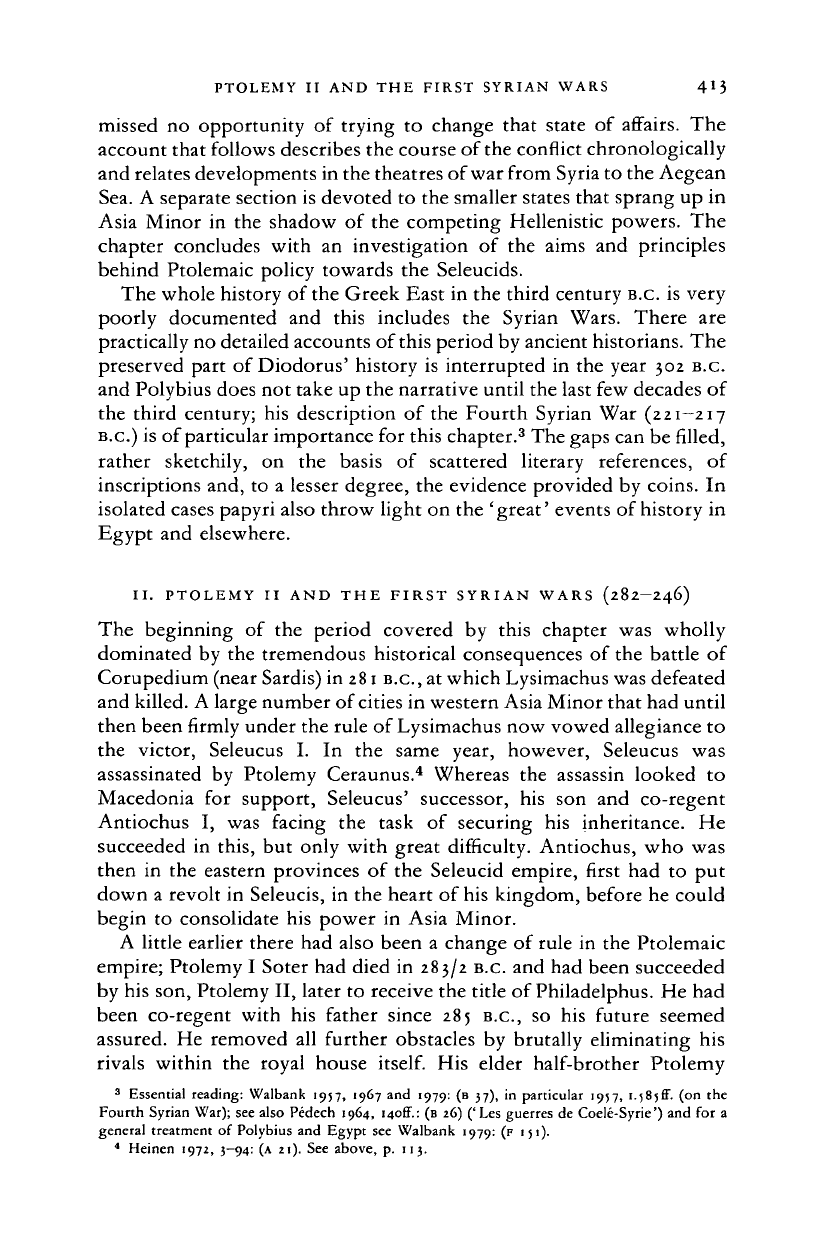
PTOLEMY
II AND THE
FIRST SYRIAN WARS
4
J
3
missed
no
opportunity
of
trying
to
change that state
of
affairs.
The
account that follows describes
the
course
of
the
conflict chronologically
and relates developments
in the
theatres of war from Syria
to the
Aegean
Sea.
A
separate section
is
devoted
to
the
smaller states that sprang
up
in
Asia Minor
in
the
shadow
of
the
competing Hellenistic powers.
The
chapter concludes with
an
investigation
of the
aims
and
principles
behind Ptolemaic policy towards
the
Seleucids.
The whole history
of
the Greek East
in
the
third century
B.C.
is
very
poorly documented
and
this includes
the
Syrian Wars. There
are
practically
no
detailed accounts
of
this
period
by
ancient historians.
The
preserved part
of
Diodorus' history
is
interrupted
in
the
year
302 B.C.
and Polybius does
not
take
up the
narrative until
the
last
few
decades
of
the third century;
his
description
of
the
Fourth Syrian
War
(221-217
B.C.)
is of
particular importance
for
this chapter.
3
The
gaps
can be
filled,
rather sketchily,
on the
basis
of
scattered literary references,
of
inscriptions
and,
to
a
lesser degree,
the
evidence provided
by
coins.
In
isolated cases papyri also throw light
on the
'great' events
of
history
in
Egypt
and
elsewhere.
II.
PTOLEMY II AND THE FIRST SYRIAN WARS (282—246)
The beginning
of the
period covered
by
this chapter
was
wholly
dominated
by the
tremendous historical consequences
of
the
battle
of
Corupedium (near Sardis)
in
281
B.C.,
at
which Lysimachus was defeated
and killed.
A
large number of cities
in
western Asia Minor that
had
until
then been firmly under
the
rule
of
Lysimachus
now
vowed allegiance
to
the victor, Seleucus
I. In the
same year, however, Seleucus
was
assassinated
by
Ptolemy Ceraunus.
4
Whereas
the
assassin looked
to
Macedonia
for
support, Seleucus' successor,
his son and
co-regent
Antiochus
I, was
facing
the
task
of
securing
his
inheritance.
He
succeeded
in
this,
but
only with great difficulty. Antiochus,
who was
then
in
the
eastern provinces
of
the
Seleucid empire, first
had
to put
down
a
revolt
in
Seleucis,
in
the
heart
of
his kingdom, before
he
could
begin
to
consolidate
his
power
in
Asia Minor.
A little earlier there
had
also been
a
change
of
rule
in
the
Ptolemaic
empire; Ptolemy
I
Soter
had
died
in
283/2
B.C.
and had
been succeeded
by
his son,
Ptolemy
II,
later
to
receive
the
title
of
Philadelphus.
He had
been co-regent with
his
father since
285
B.C.,
so his
future seemed
assured.
He
removed
all
further obstacles
by
brutally eliminating
his
rivals within
the
royal house
itself.
His
elder half-brother Ptolemy
3
Essential reading: Walbank
1957, 1967
and
1979:
(B
37),
in
particular
1957.
1
-585ff.
(on
the
Fourth Syrian
War); see
also Pedech
1964,
1406".:
(B
26) ('Les
guerres
de
Coele-Syrie')
and
for a
general treatment
of
Polybius
and
Egypt
see
Walbank
1979: (F
151).
4
Heinen
1972,
3—94: (A
21).
See
above,
p. 113.
Cambridge Histories Online © Cambridge University Press, 2008
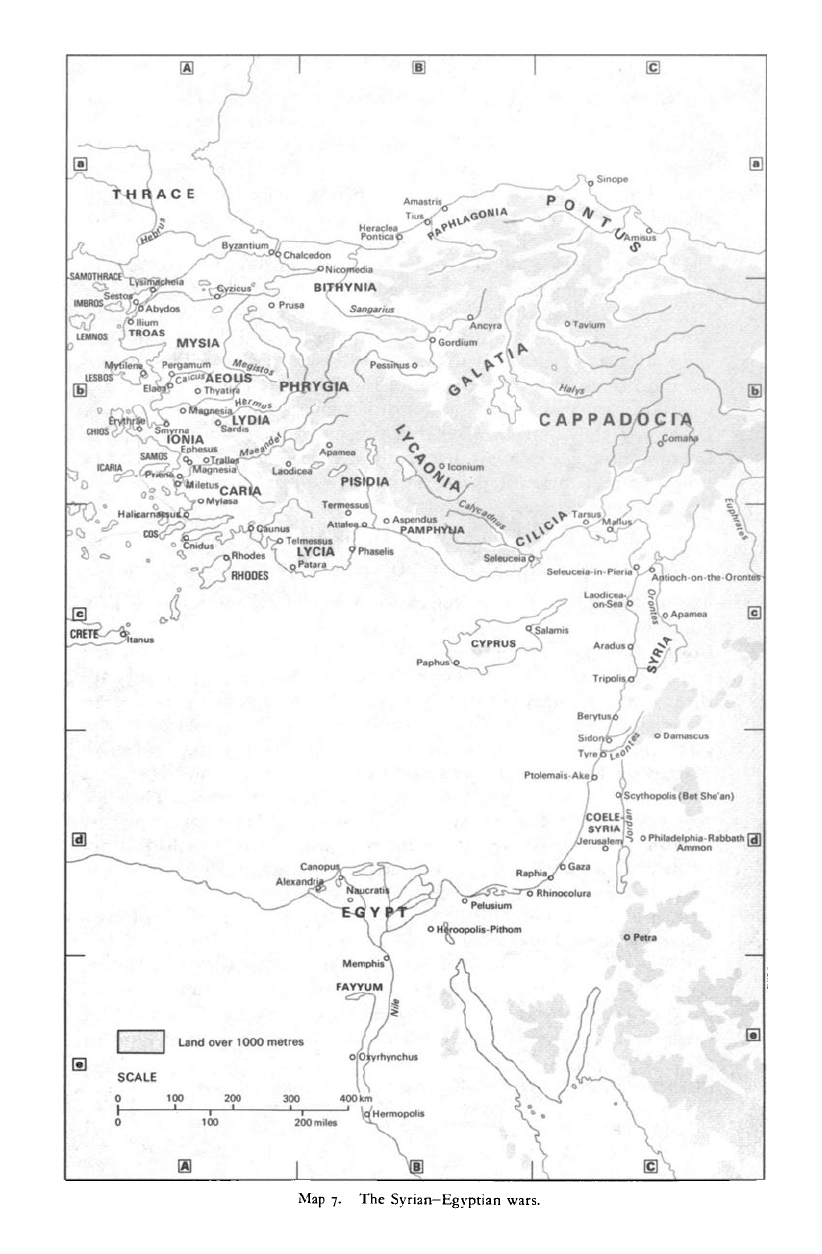
n-the-Orontes-
on-Sea P %\ ,—.
\ rvoApamea |C|
OELE
SYRIA
erus3
l
ei
j-i o Philadelphia-Rabbath [3]
o y Ammon
Map 7. The Syrian—Egyptian wars.
THRACE
vy"^-^
Chalcedon
^Ntcopnedia
BITHYNIA
Heraclea
PonttcaO
Amasins
_
T.us^
c
^
Smope
o Tavium
Ancyra
0
Gordium
Pessihus O
) O Icomum
As.
PISIDIA
Apamea
PHBYGJA
Laodicea
TermesMis
i Aspendus
PAMPHYUA
C
A P P A
0/6
C
ITA
\ ^ omeha
'
Ta?
>
us
Seteucaia
0
Si-li-iMfi.i
in
PP.-r
1,1
L.todiciM-
on-Sea
0
QSalamis
Aradus
a
TnpoliSO
Bervtuso
Sidor*tr
PtoJemais Ake
o
O Damascus
oScythopolis(Bel She'an)
con i
SYRIA
S
/Jerusalem^
> Philadelphia Rabbath
fj
Ammon
Raphia^
)Gaza
) Rhinocolura
Pelusium
O
H^roopolis-
Pithom
o Petra
Canopot-—*^—
EGYPT
Memphis
FAVVUM
|
fhynchus
\q^H«rmopoti«
Land over 1000 metres
SCALE
0
100 200 300 <
I
'
1—
1
S
0
100
200 miles
400 km
ffl
|
JB
| IB
... Itanus
CRETE
RHODES
) Telmessus
LYCIA
0
Patau
9
Phase!
is
O
o CARIA
2> o <!,
^Rhodes'
Ery.hr*>
,Oo o LYDIA
CHIOS
°
Smyrna Sardis
\/*\ IONIA
.41
<uu4ns-;
Eph
**°*
M»iK/
s*"
05
<fc
oTraltos
MYSIA
<
TROAS
IMBROS"
Y
SAMOIHRACi
SesK
LyslmaclwiH
Cyzicus
Mrtiler-
LESBOS^L
$
Ihl
El
LEMNOS
CYPRUS
Antioch
on the
OronteS
O Apamea
Cambridge Histories Online © Cambridge University Press, 2008
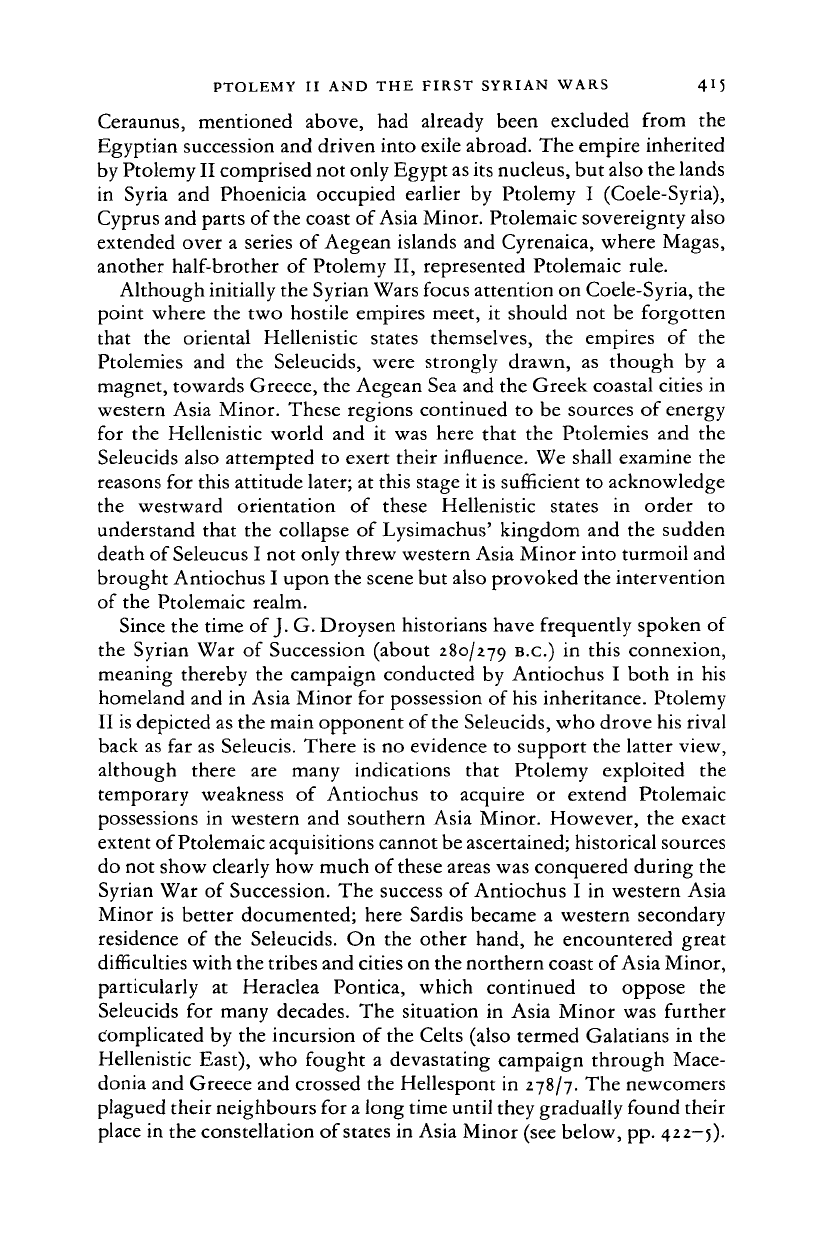
PTOLEMY II AND THE FIRST SYRIAN WARS 4
1
5
Ceraunus, mentioned above,
had
already been excluded from
the
Egyptian succession and driven into exile abroad. The empire inherited
by Ptolemy II comprised not only Egypt as its nucleus, but also the lands
in Syria and Phoenicia occupied earlier
by
Ptolemy
I
(Coele-Syria),
Cyprus and parts of the coast of Asia Minor. Ptolemaic sovereignty also
extended over a series of Aegean islands and Cyrenaica, where Magas,
another half-brother of Ptolemy II, represented Ptolemaic rule.
Although initially the Syrian Wars focus attention on Coele-Syria, the
point where the two hostile empires meet,
it
should not be forgotten
that
the
oriental Hellenistic states themselves,
the
empires
of the
Ptolemies and
the
Seleucids, were strongly drawn,
as
though
by a
magnet, towards Greece, the Aegean Sea and the Greek coastal cities in
western Asia Minor. These regions continued to be sources of energy
for the Hellenistic world and
it
was here that the Ptolemies and the
Seleucids also attempted to exert their influence. We shall examine the
reasons for this attitude later; at this stage it is sufficient to acknowledge
the westward orientation
of
these Hellenistic states
in
order
to
understand that the collapse of Lysimachus' kingdom and the sudden
death of Seleucus I not only threw western Asia Minor into turmoil and
brought Antiochus I upon the scene but also provoked the intervention
of the Ptolemaic realm.
Since the time of J. G. Droysen historians have frequently spoken of
the Syrian War
of
Succession (about 280/279
B.C.)
in
this connexion,
meaning thereby the campaign conducted by Antiochus
I
both in his
homeland and in Asia Minor for possession of his inheritance. Ptolemy
II is depicted as the main opponent of
the
Seleucids, who drove his rival
back as far as Seleucis. There is no evidence to support the latter view,
although there
are
many indications that Ptolemy exploited
the
temporary weakness
of
Antiochus
to
acquire
or
extend Ptolemaic
possessions in western and southern Asia Minor. However, the exact
extent of Ptolemaic acquisitions cannot be ascertained; historical sources
do not show clearly how much of these areas was conquered during the
Syrian War of Succession. The success of Antiochus
I
in western Asia
Minor is better documented; here Sardis became
a
western secondary
residence
of
the Seleucids. On the other hand, he encountered great
difficulties with the tribes and cities on the northern coast of Asia Minor,
particularly
at
Heraclea Pontica, which continued
to
oppose
the
Seleucids for many decades. The situation
in
Asia Minor was further
complicated by the incursion of the Celts (also termed Galatians in the
Hellenistic East), who fought
a
devastating campaign through Mace-
donia and Greece and crossed the Hellespont in 278/7. The newcomers
plagued their neighbours for a long time until they gradually found their
place in the constellation of states in Asia Minor (see below, pp. 422—5).
Cambridge Histories Online © Cambridge University Press, 2008

4l6 II THE SYRIAN-EGYPTIAN WARS AND ASIA MINOR
In about
275 or
perhaps
a
little later
-
around 270
5
-
Antiochus
I
defeated them soundly in the so-called elephant battle, but even then the
danger
was far
from removed.
It was in the
struggle against
the
Galatians and the Seleucids that Pergamum rose
to
greatness, but this
belongs
in
another section (see below, pp. 423—4).
It is possible, but not certain, that this first clash between Ptolemy
II
and Antiochus
I
was ended by a formal peace, but the root cause of the
conflict
-
the rivalry between the Ptolemies and the Seleucids
-
was not
resolved. Grounds for the next confrontation were supplied by Magas,
half-brother of Ptolemy Philadelphus and the representative of Alexan-
dria in Cyrene. His wife was Apame, the daughter of Antiochus I. It was
possibly the murders within the house of Ptolemy II and perhaps also the
latter's marriage to Arsinoe II that drove Magas to rebel against Ptolemy
and led him to take the title of
king.
The army of invasion that he led
to
Egypt
had to
withdraw without achieving
its
purpose, however,
as
Libyan nomads raised
a
revolt
in
his rear. Ptolemy
himself,
who was
preparing
to
defend
his
sovereignty, was detained
by an
uprising
at
home
— a
mutiny among Celtic mercenaries
—
and prevented from giving
chase
to the
fleeing Magas, who was now able
to
rule Cyrenaica free
from serious threat until the middle
of
the third century.
What is really astonishing is that Magas encouraged his father-in-law
Antiochus to wage war on Ptolemy but that the two allies were not able
to co-ordinate their military operations.
It
would appear that Magas'
troops
had
already withdrawn
-
probably
in
275
-
before
the
actual
outbreak of war between Ptolemy II and Antiochus
I
(the so-called First
Syrian War, 274—271). This may have been due
to
the fact that Magas'
plans were upset by the nomads' uprising and that Antiochus was tied
down in Asia Minor by the Galatians.
6
Our knowledge of the campaigns
in
the
First Syrian
War is
based
on
scattered
and
totally isolated
references;
the
discovery
of
any new source could lead
to a
thorough
amendment
of
the hypotheses proposed hitherto. As
far
as we can tell,
this war did not lead
to
any serious change in the
status quo
ante,
so that
basically
it
represented failure
for
Antiochus
I,
who was interested
in
revising the state
of
affairs. Ptolemy, on the other hand, was obviously
able to confirm his position, as otherwise Theocritus'
Idyll
xvn with its
panegyric on the Alexandrian ruler would be difficult to understand; the
idyll lays great stress
on the
extensive ring
of
Ptolemaic external
possessions
in
Phoenicia and Arabia,
in
Syria, Libya and Ethiopia,
in
Pamphylia and Cilicia,
in
Lycia and Caria and
in
the Cyclades.
Ptolemy II held magnificent displays to underline his success, or what
5
See below
p.
423
n. 26.
6
New angles
on
the relationship between Alexandria and the western territories,
in
particular
Cyrenaica,
in
Bagnall 1976, 195-209: (F 204).
Cambridge Histories Online © Cambridge University Press, 2008
